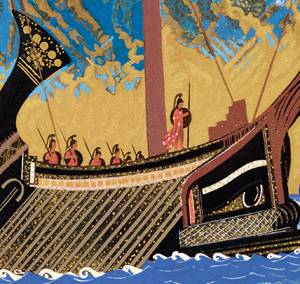The Lone Ranger says to Tonto:
"We're surrounded with Indians."
And Tonto says,
"How d'you mean 'we', kimusabi?"
I used to be dead keen on 'we'. I have in the past been one of those irritating people who walk into rooms full of people and say, "How we doing?" With friends, just as irritatingly, I've tried to be voguishly inclusive by saying, "OK, let us talk about this " and I'm connected in many three year olds' minds with a rhyme that begins, "We're going on a bear hunt. "
Recently, my love of 'we' has begun to pall. I think it was Tim Henman that did it not that I can blame the man himself. I'll try and be factual. Tim is English. Tim plays tennis. Tim tries to win Wimbledon. Now, imagine that I'm a commentator. Is it written down in the BBC Charter that I should assume that everyone watching Tim play wants him to win? Even if the majority of people watching want him to win, does that entitle me to say, "I'm sure we all want Tim to win"? John McEnroe, I've noticed, isn't English and I could see him struggling to stay on board HMS England when asked to say why Tim would win this year.
I'm English, so I don't know how people from other BBC-watching parts of the UK feel about being dragged into the English 'we'. I gather that feelings can get high when it comes to football. I understand that Brazil shirts were selling well in Glasgow in the hours before the England-Brazil game in the World Cup. So, if nothing else, the pre-match we-ish triumphalism of Motty and the rest must have grated on at least one sizeable chunk of the viewers.
I've been told that I need to lighten up about all this, but sport is war with balls. Another 'we' said that, after 'we' got knocked out, it didn't matter who won, so long as it wasn't the Germans. I take from this that opposite every 'we' is a 'they'. I've never bought this anti-German malarkey and hate being sucked into the 'we' that hates them.
But war brings out 'we's in newspaper editors. We went to war against the Argies and Saddam and now we're at war with the terrorists. I can't possibly quibble with the military use of the 'we' but how about interviewers in the Today and Newsnight studios? Aren't they crossing some line or another when their 'we's signify everyone in Britain?
More pernicious, is the 'we' that is worried about asylum seekers. I heard a BBC interviewer recently ask David Blunkett, "How many foreigners could we expect to see in Britain in five years time?" I thought, what if you're neither? I don't see myself as a foreigner, and I don't see myself as part of the 'we' that asks that question. Apart from anything else, what's a foreigner? Did he mean people from the EU? Probably not, as they're not countable anymore. So did he mean someone who is not an EU citizen? Probably not, because in most people's minds the Germans and French are foreigners.
So, what's going on here? I think it's about story-telling. We all live in a story about ourselves. We all have a sense of where we belong though this might well be several places at the same time. We all have various we's: I've got genes that make me like 50 per cent (-ish) of the world's population. I've got a nationality that makes me like some 60 million. I've got places I live in that make me like the six people I live with, the hundred or so in my street, the thousands of my borough, and millions of London. And I've got 'we's of allegiance: football clubs, political associations and some blurrily defined cultural ones too. When I think about it, I don't want to belong to the one 'we' that says I'm supporting Tim Henman, the England football team, the British Army, the British government and some strange core 'we' that isn't foreign. But many commentators and interviewers don't seem interested in offering me a choice in the matter.

